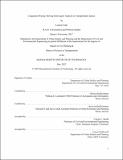Congestion Pricing: Moving from Equity Analysis to Transportation Justice
Author(s)
Craik, Lauren
DownloadThesis PDF (2.976Mb)
Advisor
Balakrishnan, Hamsa
Bunten, Devin Michelle
Terms of use
Metadata
Show full item recordAbstract
Urban traffic congestion poses challenges to American cities in the form of lost time, economic costs, increased accidents, air pollution, and barriers to mobility. Congestion pricing has the potential to be part of the solution yet also raises a number of concerns about whether pricing a public good can be done in an equitable manner. Past studies suggest the policy is not inherently unfair, however, these studies are retroactive and focus on economic notions of welfare that are at odds with how we understand the role of equity in planning. This thesis seeks to move beyond retrospective fairness evaluations and investigate how one could plan for an equitable congestion pricing scheme by proposing a new framework, inspired by the method of scenario planning, to evaluate congestion pricing. This framework will be used to examine the case of a potential congestion pricing scheme in the Boston Metropolitan Region. This study combines best practices from the field of scenario planning with spatial and statistical analysis to methodically evaluate a scheme definition and understand how subpopulations are impacted differently by charging. This thesis will also analyze the distributional impacts, making use of travel diary data and the synthetic control method, of the London Central Charging Scheme to illustrate how scheme design and policy levers can contribute to differential behavioral responses.
Date issued
2022-05Department
Massachusetts Institute of Technology. Department of Civil and Environmental Engineering; Massachusetts Institute of Technology. Department of Urban Studies and PlanningPublisher
Massachusetts Institute of Technology